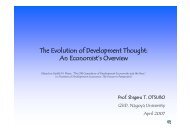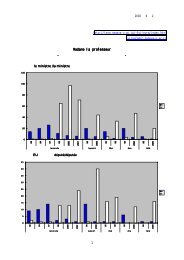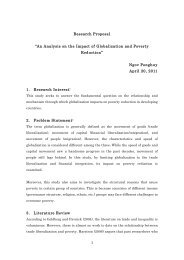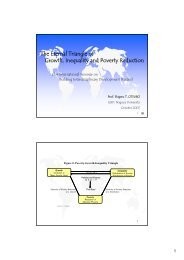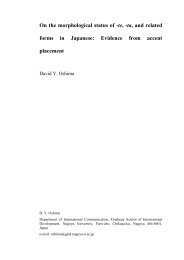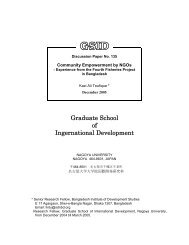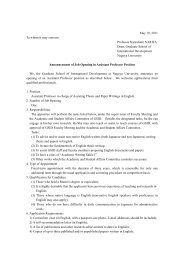Report
Report
Report
You also want an ePaper? Increase the reach of your titles
YUMPU automatically turns print PDFs into web optimized ePapers that Google loves.
190 QUANTIFICATION OF BENEFITS FROM ECONOMIC COOPERATION IN SOUTH ASIA<br />
As in the case of India, the role of the services sector<br />
is crucial in sustaining the growth of Pakistan’s<br />
economy. The services sector in Pakistan has sustained<br />
strong growth for the last six successive years. The<br />
sector has been a major contributor to the overall<br />
growth in GDP with its remarkable real growth<br />
averaging 7% over the past four years while major<br />
growth at the rate of 8% or more occurring only in the<br />
last two years (Burki and Hussain 2007). Thus, services<br />
are assuming the role of a new growth powerhouse in<br />
the country by contributing 68% to GDP growth in<br />
2005-06. As Pakistan’s economy has grown rapidly,<br />
the sustained high pace of growth in the economy is<br />
also reflected in a record level of investment during<br />
2006-07, with the investment to GDP ratio rising to a<br />
record high of 23% (State Bank of Pakistan 2007).<br />
Another striking feature was the unprecedented level<br />
of FDI ($5.1 billion) in the economy.<br />
Like Pakistan, with the advent of economic liberalisation<br />
in Bangladesh since late 1980s, inflow of FDI<br />
registered an upward trend from a very low base. Total<br />
FDI inflow increased from $ 92 million in 1995 to $<br />
579 million in 2000 and reached 845 million in 2005.<br />
The economist intelligence unit (EIU) in its report on<br />
‘World Investment Prospects to 2010: Boom or Backlash?’<br />
showed that Bangladesh will receive $ 600 million<br />
of FDI on an average a year during the period between<br />
2006 and 2010 (Xinhua 2006). As per FDI projection<br />
in the report, Bangladesh is in the third position among<br />
the South Asian nations. India and Pakistan securing<br />
19th and 64th position respectively have left Bangladesh<br />
behind them in this subcontinent while Sri Lanka<br />
attaining 81st position has been placed behind Bangladesh.<br />
As regards Nepal, India is the chief source of FDI<br />
in Nepal so far, followed by the United States, the<br />
People’s Republic of China, the British Virgin Islands,<br />
Norway, Japan, the Republic of Korea, Canada and<br />
Hong Kong, China in terms of the amount of approved<br />
FDI (UNCTAD-ICC 2003). The major area of FDI has<br />
been manufacturing, followed by services and, in<br />
particular, tourism (Ibid. 18). India is an important<br />
source of investments in Bhutan and Maldives as well.<br />
Special Treatment for LDCs<br />
The GATS regime is particularly important to LDCs,<br />
which suffer from severe constraints to economic<br />
development due to poor infrastructure and a lack of<br />
institutional and human capacities to cope with the<br />
challenges arising out of the liberalisation of trade in<br />
services (Raihan and Mahmood 2004). Others explain<br />
how LDCs are left behind in the services sector<br />
(CENTAD 2007). There are systemic domestic factors<br />
such as poor quality of public spending in key sectors<br />
like education, and skewed direction of public spending<br />
– in favour of services consumed by rich households.<br />
In view of their special position, the modalities have<br />
been developed for LDCs with an aim to provide the<br />
required flexibility to actively participate in the ongoing<br />
services negotiations. As per the provisions of the LDC<br />
Modalities, LDCs should not be obliged to offer<br />
national treatment to foreign service providers or to<br />
make ‘additional commitments’ (GATS Article XVIII)<br />
on regulatory issues – e.g. qualifications, standards and<br />
licensing requirements (WTO 2003). In response to<br />
requests, LDCs have been given flexibility to make<br />
commitments compatible with their development, trade<br />
and financial needs and which are limited in terms of<br />
sectors, modes of supply and scope.<br />
The modalities also provide that ‘preferential market<br />
access mechanism’ should be created for achieving<br />
effective market access for LDCs to developed country<br />
markets. Regarding movement of natural persons<br />
members should open their markets to all categories of<br />
natural persons from LDCs, particularly unskilled and<br />
semi-skilled persons. However, what is interesting about<br />
these Modalities is that they significantly reduce the<br />
negotiating burden of LDCs, which are now expected<br />
to be able to focus on just a few sectors of export and<br />
import interests (Raihan and Mahmood 2004)<br />
The LDC modalities seem to be one of the reasons<br />
why Bangladesh and the Maldives have not yet submitted<br />
any offers during the ongoing services negotiations.<br />
However, unless they offer commitments they<br />
may not be able to seek market access for their services<br />
and eventually not making any commitments will not<br />
be in their own economic interest. In this regard, Raihan<br />
and Mahmood suggest that the GATS negotiations are<br />
strategically important for LDCs, including Bangladesh,<br />
for the following three fundamental reasons: retaining<br />
and deepening competitiveness in goods exports;<br />
opportunities through increased tradability of services;<br />
and improvement of quality of services in domestic<br />
markets (2004). They also argue that LDCs should stop<br />
insisting that they do not need to open any sectors. In<br />
fact, they further argue, many sectors would benefit<br />
through an open policy regime and a predictable competitive<br />
environment.<br />
Analysis of the requests to Bangladesh made by<br />
various developed countries suggests that professional,<br />
business services, and construction and related<br />
engineering services are among those services in which




